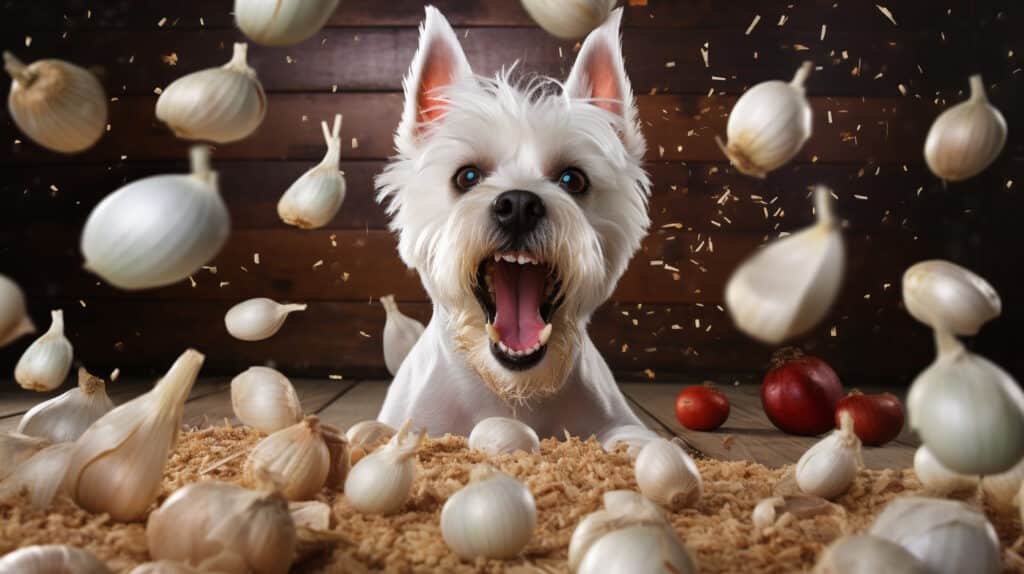Key Takeaways
- Onion toxicity can occur after eating fresh or dried onions, dietary supplements, or food preparations.
- Disulfides and thiosulfate in onions are metabolized and cause damage to red blood cells, which can lead to anemia.
- The prognosis for onion toxicity is generally good with early decontamination treatment and supportive care.
Onions are a staple in most cuisines, but did you know that they can make our dogs super sick? Onions (Allium cepa) belong to the Allium family of herbs, which contains over 90 species. All parts of these plants are toxic to dogs, whether raw, cooked, or even dried.
Onion is commonly found in many pre-made human foods, such as sauces and even baby foods.
The toxins contained within onions are thought to be the organosulfar compounds, disulfides, and thiosulfinates which are known to cause damage to red blood cells.
Red blood cells are responsible for carrying oxygen throughout the body within the bloodstream, so damage to them can be serious for our canine companions.
How much onion is toxic to dogs?
Dogs vary in their sensitivity to onion poisoning, with some at higher risk, particularly if they have other diseases, such as kidney disease.
Some studies have shown that there have been changes in the blood parameters of dogs fed just 15g of onion per kg body weight, but no two dogs behave the same in response to onion ingestion.
What we do know is that pooches consistently show signs of toxicosis, having eaten just 0.5% of their body weight in onions.
The average 20kg pooch would just need to eat one medium-sized onion (about 100g) in order to experience toxic effects.
With the presence of onion powder, which is dried onion, in many foods, including baby foods, it wouldn’t take long for your pooch to eat a toxic amount. Remember, onion powder is much more concentrated than whole onion. If your dog is a typical Japanese breed such as an Akita or Shiba Inu, then they may be more susceptible to onion toxicosis due to hereditary reductions in glutathione and potassium concentrations.
Also, dogs that are suffering from other diseases that cause “oxidative stresses” on the body, such as diabetic ketoacidosis or that have anemia, are more likely to develop severe signs of toxicity after onion ingestion.
Interestingly, onions are much more toxic to cats than dogs, so if you have any feline friends in your home, you should definitely keep onions away from them.
What would happen if my dog ate an onion?
Onions contain a chemical called N-propyl disulfide, which causes the breakdown of red blood cells, leading to anemia.
This chemical toxin causes oxidative damage to red blood cells through attachment to the oxygen molecules within the cells, thus reducing the ability of the cells to carry oxygen.
N-propyl disulfide also acts as an antigen in your dog’s body. It tricks their immune system into treating their own red blood cells as an external invader, leading their destruction in a process called hemolysis, thus causing hemolytic anemia.
Through stimulation of the immune system and attacking red blood cells, onion toxicosis affects the cardiovascular and respiratory systems while the breakdown of red blood cells then puts strain on your dog’s kidneys, causing damage to them.
Alongside all these effects, onions can elicit an inflammatory response directly within the gastrointestinal tract, causing pain, diarrhea, and vomiting, too.
When Should I Take My Dog To the Vet?
You should always call your veterinarian if your pooch has eaten onion, even if it ends up just being for some advice to discuss your dog’s situation.
You should try and have the following information to hand to help your dog determine if your pooch has eaten a toxic amount of onion and also what the treatment plan should be:
- Approximately how much onion has your dog eaten?
- Approximately when your dog ate the onion?
- Rough weight of your dog
Suppose you witness or know your dog has eaten an onion. In that case, you can also telephone the Pet Poison Helpline at (855)-764-7661 with the above information to determine if your dog needs to see your veterinarian.
What if my dog ate plenty of onions but seems fine?
No two dogs are the same in their response to having eaten onion, but a good rule of thumb is if your pooch eats 0.5% of their body weight, then they are at risk of toxicosis.
This means that if a 30kg dog eats just 150g of onion or an onion product, which is the equivalent of just one medium onion then they are at risk of poisoning.
There are two typical types of onion toxicosis: acute and chronic exposure. While acute toxicosis is more common when a dog eats a toxic amount in a single sitting, chronic toxicosis to onions is also possible if a dog is fed smaller amounts over a few days.
There is a lag phase between when dog’s eat onions and when they start to get sick. While some dogs may show signs of an upset tummy within 24 hours, it can take up to a week for most clinical signs to become evident. This is because most clinical signs are associated with the loss of red blood cells.
You should still contact the dog Poison Helpline and your veterinarian in order to ascertain your dog’s risk and institute early decontamination and treatment.
Signs that my dog ate an onion
There are a lot of possible clinical signs that your dog has eaten an onion, and they aren’t all specific to onion ingestion.
While some signs, such as vomiting and diarrhea, may appear within a day of ingesting onion, the majority of the clinical signs are associated with the destruction of red blood cells and will take days or even a week in order to become evident.
Clinical signs of onion ingestion include:
- Vomiting
- Diarrhea
- Abdominal pain
- Mucosal erosions similar to mouth ulcers in humans
- Tachycardia (high heart rate)
- Hypotension (low blood pressure)
- Tachypnea (high breathing rate)
- Lethargy or depression
- Pale, yellow, or blue-tinged mucous membranes
- Pigmenturia (red-colored urine)
- Reduced apdogite
How do veterinarians treat dogs that have eaten an onion?
Treatment for onion ingestion will depend on how soon after the ingestion your dog attends your veterinarian’s clinic.
If your dog has just eaten the onion within a couple of hours, then treatment will focus on decontamination which involves inducing emesis in your dog and then the administration of activated charcoal to prevent further absorption of the onions into their system.
Your vet will also perform baseline blood work and advise monitoring your dog’s red blood cells for up to a week after ingestion.
dogs that present to the veterinarian’s clinic already showing clinical signs such as vomiting, diarrhea, discolored urine, or low blood pressure may require hospitalization with supportive care, including intravenous fluids and symptomatic treatment. Unfortunately, there’s no antidote to onion poisoning.
Severe cases of onion poisoning may require a special transfusion of red blood cells while dogs with mild anemia should have their activity restricted until their red blood cell count has returned to normal levels.
How Long Will it Take My Dog to Recover?
The road to recovery will vary depending on a number of factors, such as concurrent diseases that your dog may suffer with, how much onion your dog has ingested, and how long it’s been since your dog ate the onion product.
dogs that just need to have vomiting induced and don’t display any clinical signs may be given a clean bill of health within a week of ingestion once their red blood cell levels are normal. On the other end of the spectrum, your dog may be hospitalized for several days to a week or so if they require intensive care and a blood transfusion to treat their clinical signs.
Early and aggressive treatment is key to a good prognosis, but dogs that recover don’t usually require long-term care. As require
Final Woof
Our canine companions are very susceptible to onion toxicosis, and it can be fatal in some cases. Luckily, if your dog is seen by your veterinarian rapidly and receives aggressive treatment, then the prognosis for a full recovery is good.
Remember, all parts of the onion are toxic, and it’s no less dangerous when cooked, so never feed your dog onions or food that contains onions.


